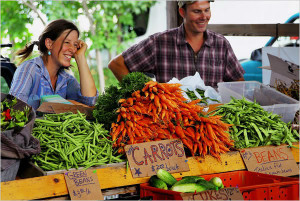When our group started working with farmers markets a few years ago we created a strong partnership with the North Carolina Department of Agriculture and Consumer Services. Together, with funding from the North Carolina Tobacco Trust Fund, we developed best practices and engage directly with market managers and vendors through workshops and on-site visits. Since 2010 the curriculum we developed has been delivered to over 1000 managers and vendors and we’ve got some data that shows it led to some infrastructure and practice changes.
The Daily American reports that Pennsylvania farmers markets will soon be required to address food safety more stringently.
Producers selling at farmers’ markets will soon have to abide by some extra rules. Officials from the local farmers markets do not seem to think it will present much of a problem, because local producers already are very safety conscious when growing and handling their product. They sell directly to their buyer and want to provide a safe quality product, to insure customer satisfaction and repeat sales.
“The regulations shouldn’t be that big of deal for our market,” Larry Cogan, president of the Somerset County Farmers’ Market said. “The producers are already doing a good job of properly growing and handling the produce to prevent contamination of E. coli (and other stuff? -ben). The chain is very short from producer to consumer and easy to trace if there was a problem. Our market is a ‘producers only’ market, meaning that the products are marketed by the people who have grown or produced it.”
Short distribution chains might make tracing easier – but don’t really mean much when it comes to keeping pathogens off of food in the first place.
Cogan felt that the new rules would be more of a problem for larger commercial produce growers where produce is shipped to many different locations and then is resold to other markets. At farmers’ markets, producers sell directly to the consumer. Also, in commercial markets the number of people handling produce is greater, and all employees would have to be trained about proper washing of vegetables, personal hygiene and hand washing prior to handling the produce.
“It is mostly just using common sense about washing produce, and hand washing after using the restroom,” Cogan said. “Our food system in the United States is great! It’s the safest food supply around.”
“It’s the responsibility of the market vendors to follow all rules and regulations regarding the products that they sell here,” Jim Green, market manager of the Springs Farmers’ Market, said. “Such as making sure that meats and cheeses are kept in coolers or having kitchens inspected. The vendors do a good job of handling their foods safely. Many of the vendors are aware of new rules and regulations as soon as they are announced.”
Throughout our project, former graduate student Allison Smathers saw some risky practices when it came to providing samples – stuff like dirty equipment and a lack of hand washing. And using untreated water for handwashing.
Eleven private wells in Kewaunee County that were being tested as part of a DNR-funded study showed the presence of salmonella and/or rotavirus, the Department of Natural Resources announced late Monday.
The samples were taken April 18, according to Mark Borchardt of the USDA Agricultural Service, who is conducting tests as part of a larger DNR study of the county’s wells. The 11 wells were among 30 that were randomly selected from 110 wells that were found to be contaminated in samples taken last November, Borchardt said.
All the farmers’ market food safety stuff we have can be found here.
